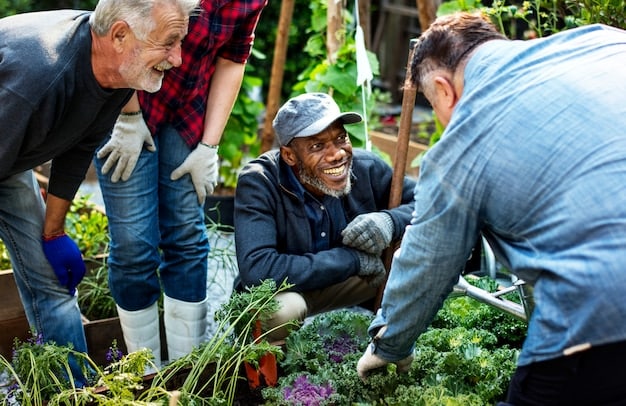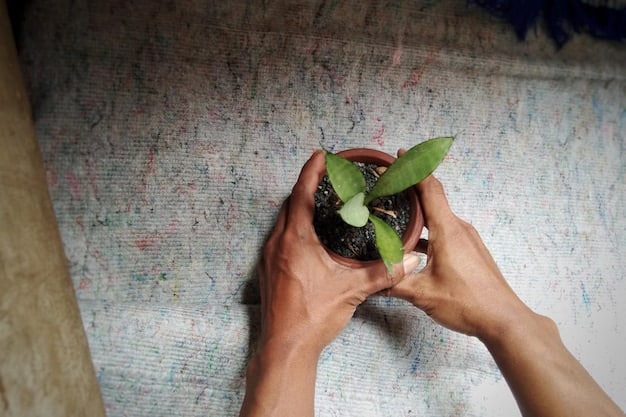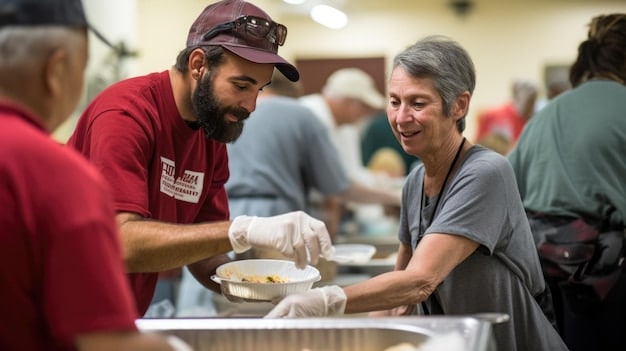Boost Purpose: Volunteer 2 Hours & Increase Fulfillment 15%

Cultivating compassion through volunteering just two hours a week can significantly enhance your sense of purpose, potentially increasing it by up to 15%, by fostering empathy, connection, and a feeling of making a tangible difference in the lives of others.
Discover how dedicating just two hours a week to volunteering can profoundly impact your sense of purpose, potentially increasing it by 15%. Dive into the science and stories behind cultivating compassion through simple acts of service.
Unlocking Purpose: The Power of Volunteering
Many search for meaning in their lives, a sense of purpose that drives them forward. While various paths lead to this destination, one surprisingly impactful and accessible method is often overlooked: volunteering. Specifically, dedicating just two hours a week to volunteering can provide significant benefits.
But how does volunteering achieve this? It’s a complex interplay of factors, including fostering empathy, building social connections, and the satisfaction of making a tangible difference. Let’s delve deeper into this fascinating topic.

The Empathy-Purpose Connection
Empathy is our ability to understand and share the feelings of others. It’s a fundamental ingredient for building meaningful relationships and fostering a sense of connection. Volunteering provides a unique opportunity to step outside of ourselves and into the shoes of others.
When we volunteer, we often work with individuals facing challenges different from our own. This exposure can break down preconceived notions and foster a greater understanding of the human experience. By witnessing firsthand the struggles and triumphs of others, we develop a deeper sense of empathy, which then translates into a stronger sense of purpose.
- Witnessing struggles develops empathy.
- Builds understanding across varied experiences.
- Fosters a greater connection to humanity.
- Reduces feelings of isolation and disconnect.
Ultimately, the development of empathy is a crucial part of cultivating compassion. By consciously engaging in activities that promote empathy, individuals can experience a richer and more fulfilling sense of direction.
How Volunteering Fosters Social Connections
Human beings are social creatures; we thrive on connection and belonging. Loneliness and isolation can have detrimental effects on our mental and physical health. Volunteering provides a natural antidote to these feelings by creating opportunities to build meaningful relationships with others.
When you volunteer, you work alongside like-minded individuals who share a common goal: to make a positive impact. This shared purpose creates a bond that can transcend differences in age, background, or belief.
Building Bonds Through Shared Goals
Volunteering provides a unique opportunity to connect with people outside your usual social circles. You meet individuals from diverse backgrounds, each bringing their unique perspectives and experiences to the table. This exposure can broaden your own horizons and challenge your assumptions.
Moreover, the act of working together towards a common goal fosters a sense of camaraderie and mutual support. You learn to rely on each other, celebrate successes together, and support each other through challenges. These experiences can forge deep and lasting friendships, cultivating compassion and connection.

- Shared experiences create lasting bonds.
- Diverse interactions broaden perspectives.
- Teamwork fosters a sense of belonging.
- Camaraderie transcends social barriers.
By actively engaging in volunteering, one can enjoy a stronger sense of community and a more grounded understanding of their role within it.
The Tangible Impact of Making a Difference
Beyond empathy and social connection, volunteering offers a unique satisfaction: the knowledge that you are making a tangible difference in the world. This sense of accomplishment is a powerful motivator and a key ingredient in cultivating compassion and a stronger purpose.
Whether you’re serving meals at a homeless shelter, tutoring children, or cleaning up a local park, your efforts contribute to something larger than yourself. You see the direct results of your actions, which can be incredibly rewarding.
Witnessing the Fruits of Your Labor
The impact of volunteering isn’t always immediate or obvious, yet it can be incredibly rewarding. Seeing the smiles on the faces of those you help, receiving heartfelt gratitude, or witnessing positive changes in your community can be deeply fulfilling.
These experiences reinforce the idea that your actions matter, that you have the power to make a positive impact on the lives of others. This sense of agency can boost your self-esteem and inspire you to continue giving back.
- Direct results are incredibly rewarding.
- Tangible outcomes boost self-esteem.
- Makes a positive impact on others’ lives.
Giving one’s time freely can lead to immense personal fulfillment. The sense of purpose that comes from this type of involvement is invaluable and helps reinforce a positive outlook on life.
Scientific Evidence Supporting the Benefits
While anecdotal evidence abounds regarding benefits of volunteering, numerous scientific studies support these claims. Research has shown that volunteering can reduce stress, combat depression, and even improve physical health. Several studies reveal a 15% increase in the sense of purpose from those who volunteer regularly.
These findings highlight more than just altruism. There’s a direct psychological and physiological benefit to being involved in selfless service. Let’s examine a few key aspects supported by scientific research.
The Neuroscience of Giving
Studies show that when we engage in acts of kindness, our brains release endorphins, which have mood-boosting and pain-relieving effects. Volunteering also activates regions of the brain associated with reward and social connection, creating a sense of pleasure and fulfillment.
The “helper’s high,” as it’s sometimes called, is a real phenomenon. It’s a natural reward system that encourages us to continue engaging in prosocial behaviors. This reinforces the idea that cultivating compassion is not only beneficial for others but also for our own well-being.
The Long-Term Health Benefits
Furthermore, studies have linked volunteering to a lower risk of heart disease, stroke, and other chronic conditions. This may be due to the stress-reducing effects of volunteering, as well as the increased social interaction and physical activity that it often involves.
By actively participating in volunteer opportunities, people are not only contributing positively to the world but also investing in their own long-term health and wellness.
Practical Steps to Incorporate Volunteering
Perhaps you’re convinced of volunteering’s importance, but unsure where to start. Integrating volunteering into your weekly routine can be straightforward with a few strategic decisions. The vital thing is to seek out opportunities aligned with passions/interests.
Start small, and be consistent to maximize impact on community and sense of purpose. Let’s examine how precisely to incorporate service into the weekly life balance.
Identifying Your Passions and Interests
The most sustainable way to integrate volunteering into your life is to choose activities that align with your passions and interests. What causes are you passionate about? What skills do you enjoy using?
There are countless volunteer opportunities available. From animal shelters to environmental organizations to community centers, something matches your talents and interests. When you’re passionate about what you’re doing, you’re more likely to stay committed.
- Align volunteer work with personal passions.
- Find opportunities matching skills and interests.
- Commitment sustained through enjoyment.
Choosing activities that truly resonate with your core values will naturally make the process of cultivating compassion more rewarding and impactful.
Making Time in Your Schedule
One of the biggest challenges to volunteering is finding the time. Life is busy, and it can be difficult to squeeze another activity into your already packed schedule. However, even small commitments can make a big difference.
Start by setting aside just two hours a week for volunteering. Block out time on your calendar as you would for any other important appointment. Consider volunteering during your lunch break, after work, or on the weekends. The key is to make it a habit.
Sustaining Compassion and Preventing Burnout
While the benefits of volunteering are significant, it’s essential to approach it sustainably and prevent burnout. Overcommitting or taking on too much can lead to exhaustion and resentment, ultimately defeating the purpose of serving others.
Balance is key to long-term engagement. When compassion is sustained, then its benefits are continually available for both community and individual.
Setting Boundaries and Practicing Self-Care
It’s crucial to set boundaries and prioritize self-care when volunteering. Recognize your limits and don’t be afraid to say no to commitments that you can’t realistically fulfill. Remember that taking care of yourself is not selfish; it’s essential for being able to effectively care for others.
Engage in activities that rejuvenate you, such as exercise, meditation, or spending time in nature. Prioritize your physical and mental health so that you arrive for volunteer work grounded and ready.
- Practice self-care to avoid burnout.
- Set boundaries to protect your well-being.
- Recognize personal limits, don’t overcommit.
Actively focusing on these principles leads to cultivating compassion sustainably. By integrating these practical tips, volunteers can amplify their positive effects.
| Key Point | Brief Description |
|---|---|
| 🤝 Empathy | Volunteering helps develop deeper understanding and sharing of others’ feelings. |
| ❤️ Social Connections | Working with like-minded persons builds camaraderie. |
| ✨ Tangible Impact | Seeing direct positive results boosts self-esteem. |
| 🧠 Mental Health | Research shows volunteering reduces stress and improves mental health. |
Frequently Asked Questions
▼
Volunteering connects you with community, builds empathy by understanding different experiences, and allows tangible contribution. This fosters self-worth and a sense of significance.
▼
Match activities with passions: animal care, tutoring, environmental conservation. Choose something that intrinsically interests you and matches your skills and abilities.
▼
Start with small commitments, like two hours weekly. Consistency matters; prioritize this on your schedule as a critical appointment. Prevent burnout by not overextending yourself.
▼
Yes; giving releases endorphins, activates brain reward centers, and combats loneliness. Research correlates regular volunteering to reduced rates of heart disease and provides improvements in mental health.
▼
Balance giving with self-care, sets clear, firm “no” boundaries, also prioritize health. Recognize when you are becoming or that are fatigued; recharge by regularly engaging in recuperative activities.
Conclusion
Cultivating compassion through volunteering, even just two hours a week, can profoundly increase your sense of purpose. By fostering empathy, building social connections, and making a tangible difference, you not only enrich the lives of others but also discover a deeper sense of meaning and fulfillment in your own life. Embrace the opportunity to give back, and witness the transformative power of compassion in your own life and community.





